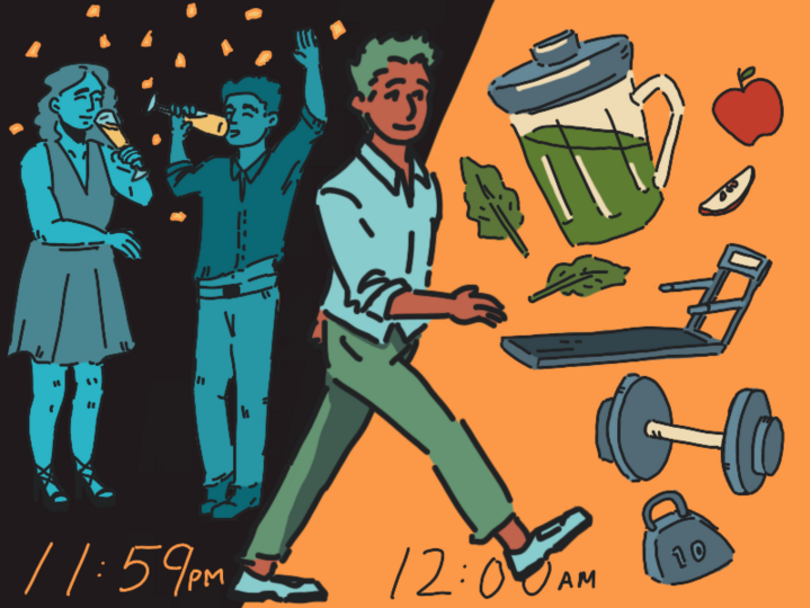‘All-or-nothing’ mentalities shouldn’t define your New Year’s resolutions

Illustration by Flynn Ledoux
The new year always inspires resolutions, but our columnist says our goals are often too rigid or intense. Instead, we should focus on healthy practices that don't require full-on lifestyle turnarounds.
Get the latest Syracuse news delivered right to your inbox.
Subscribe to our newsletter here.
While other heavy drinking holidays may result in a bad hangover, mozzarella sticks and a blue slushie, New Year’s Eve results in a new gym membership and an email from Amazon confirming your order of a bullet journal and a pack of really pretty highlighters.
In the hours leading up to the new year, there is a sense of urgency to fit in as much unrestrained behavior as possible. It’s often seen as a last chance to go overboard before “the new you” is born on Jan. 1. All those final overindulgences are fair game until the version of you who doesn’t meditate or go to the gym is deemed as unacceptable.
This concept, which I’ll refer to as “final indulgence,” is everywhere in our culture. It is such a widespread phenomenon that says a lot about our rigid and binary view of life.
Americans are frequently viewed by citizens of other nations as having a culture that lacks self control and surrounds constant consumption and greed. Everything is extreme in the U.S.: and this idea is perpetuated by politicians, advertisements, portion sizes at restaurants – even the sheer number of lanes on many American highways is extreme.
This cultural attribute of extremes goes both ways though, and is most resoundingly obvious during the month of January, when the motivation to ditch our hedonistic tendencies is promoted by the comforting thought of a clean slate. The phrase “New year new me!” is revived once the clock strikes midnight.
New Year’s resolutions, though intended to be a positive way to make life changes, are oftentimes extreme. Past studies have shown that many gyms will see a sharp increase in attendance and membership purchases, and then will see a drastic decrease on almost the same day every year, about three weeks later. This has become such a classic trope that economists have given it a name: “quitter’s day.”
Let’s say you decided to stop eating sweets as your resolution, but you cave on Jan. 15 by eating a piece of your mom’s birthday cake. This is an example of the aftermath of the final indulgence mentality. The idea that you will completely stop eating sweets in the new year is daunting. The finality and rigidity of the resolution destined it for failure.
And that’s the main issue with this – in attempting to self-improve by setting an extreme resolution, you’ve really just built a subconscious association between chocolate cake and failure. But you’ve also reminded yourself of the neural association between eating cake and the glorious release of dopamine that you’ve been craving. These two conflicting messages only feed into our culture of extremes: which leaves very little gray area for us to make healthy changes in our lives.
Resolutions are a way to dedicate time to self betterment, which is a constant process. Instead of striving for instantaneous, all-or-nothing change, we can become more balanced, compassionate people when we approach self-growth this way.
Accepting non-linear progress in ourselves gives us a greater empathy for others, too: we are more likely to see the complexities in human nature once we move away from the rigidity our culture often propagates. This, in turn, allows us a greater capacity to combat the extremes that permeate our politics, beauty standards and consumption culture.
So this New Year’s, remember the concept of final indulgence, and try to find balance. And even if you don’t, at least allow yourself the joy of a blue hangover slushie alongside your resolutions.
Maya Aguirre is a sophomore Magazine, News and Digital Journalism major. Her column appears biweekly. She can be reached at msaguirr@syr.edu.





